Russian Poland: autonomy, as it was said
- Of course, there are Jews among the spies, but there are much more Polish spies.
From the front conversations of Prince Obolensky, August 1915
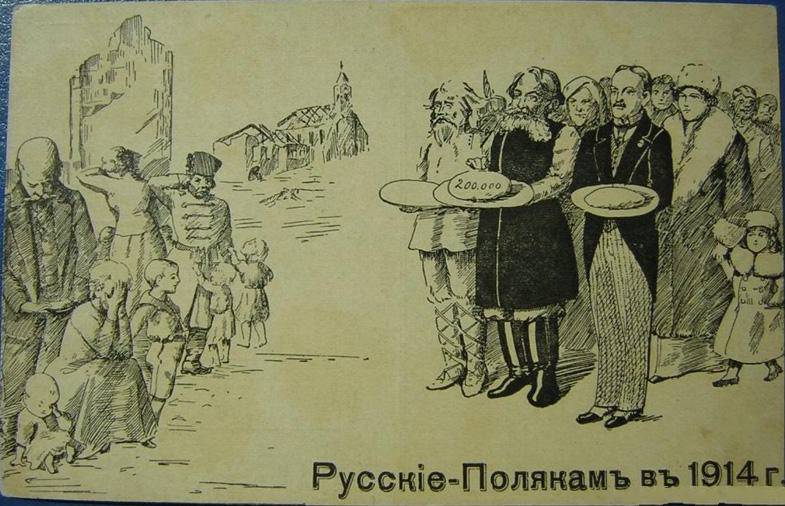
In the spring of 1915, Nicholas II went on an inspection trip to the front. Obviously, in a simple visit to Russian troops in combat positions, their supreme head, the All-Russian emperor, could not meet any particular obstacles, except for concern for the personal safety of the monarch. But some circles meant to give Nicholas II a visit to the conquered land (Galicia) a much more impressive act, which could morally reinforce Russia's desire for the future accession of the Slavic lands of Transcarpathia. It is clear that a trip of this kind could already cause doubts of a political nature (1).
As far as unpredictable could be the foreign policy resonance on the visit of Nicholas II to Galicia, it is easy to judge at least from the letter of the ambassador in London AK Benkendorf to Minister of Foreign Affairs 12 / 25 in May 1915
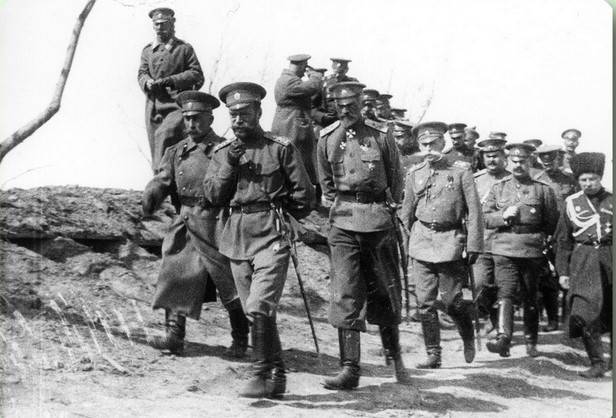
Nicholas II and the Grand Duke Nikolai Nikolayevich on the road to the fallen Przemysl
And yet the emperor's trip to Galicia took place - immediately after the capture of Przemysl. Hardly anyone then could have imagined that the Russians would soon have to leave Galicia. It is characteristic that these days the emperor himself was perhaps the most ardent “Russifier” - he firmly demanded that the commander-in-chief curb all initiatives to form Polish units and formations in the Russian army. The formation of the legions immediately ceased, starting to distribute the new conscripts from the Polish provinces evenly across the units. The same units that had already been formed were renamed: banners to hundreds, legions — to brigades and detachments with direct subordination to the new Warsaw Governor-General, Prince LD Engalychevu.
But the fate of the war, as you know, is changeable: the time of the victories of the Russian arms was replaced by a time of severe defeats. Gorlitsky breakthrough in the spring of 1915 completely changed the agenda, and the Russian military command, unlike politicians, for a time completely forgot about the Poles. However, the very real prospect of losing the entire territory of the Kingdom of Poland practically forced the royal bureaucracy to return to the Polish question.
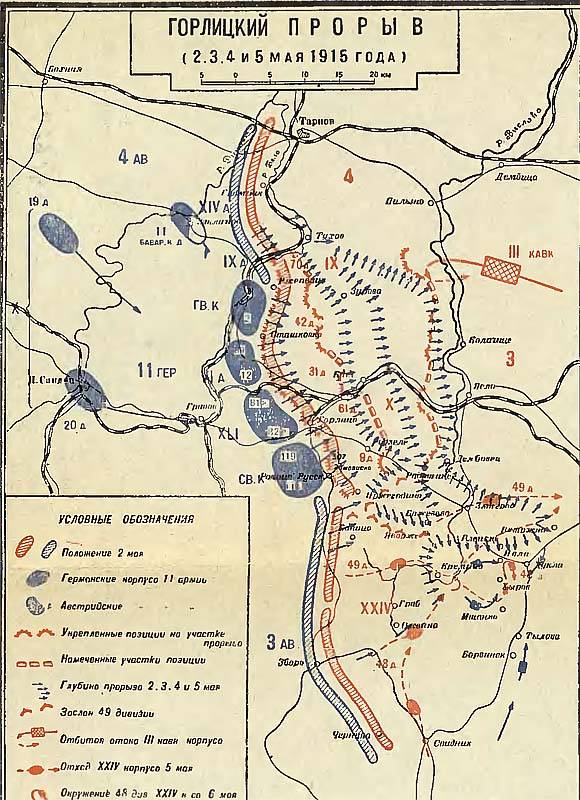
Gorlitsky breakthrough 1915
Late initiative
It was already discussed at the height of the great retreat — first in the Council of Ministers, where Prince Velepolsky, Dmovski and Grabski were first invited at once, and then at a meeting at the 14 rate of June 1915. (3) The word “autonomy” at that moment is only heard in the memoirs of Yu.N. Danilov, as well as other participants in the meeting in the rate. But the researchers did not manage to find such a clear term in the materials of the meeting.
17 June was announced “the formation of a special meeting chaired by I.L. Goremykin for a preliminary discussion of questions on the implementation of the principles announced in the appeal of the Supreme Commander from 1 of August 1914. ” The composition of the special meeting was defined in 12 people, and Polish and Russian public figures in equal numbers. In the absence of Goremykin, it was given to Secretary of State S.E. Kryzhanovsky.
The message about the beginning of the meeting with the June 20 passed in the newspapers the next day. 22 June 1915, the first full meeting was held. The Russian side was represented on it as members by Prince D.N. Svyatopolk-Mirsky, P.N. Balashov, N.P.Shubinsky and members of the State Council, Professor D.I. Bohaley, A.D. Samarin and A.A. Khvostov, Polish - AE Meishtovich, KG Skirmunt, S.I. Lopatsinsky, members of the State Council, and others.
With the opening of the meeting, the Polish representatives sent a loyal telegram to the emperor, where the famous motive about the “unity of fraternal peoples under the Romanovs scepter” sounded again. A similar telegram was sent to the supreme commander. June 27 Samarin, who did not participate in the first days of the meeting, was replaced by State Councilor APNikolsky. In addition, Comrade Minister of Public Education Raczynski was involved in the meeting. Then Balashov was absent from the meeting. In addition to the six Russian participants, I.L. Goremykin and S.E. Kryzhanovsky.
Already in the course of the meeting, the Cadet Rech, with obvious hope, noted: "Disagreements came to light only on issues related to the large program of the structure of the Kingdom of Poland." In general, during the meeting, two categories of questions were singled out - 1) the structure of Poland in the event of unification; 2) device in case of non-unification and urgent reforms.
The meeting participants began their work immediately by discussing the issues of the second category, which are more relevant, mostly in terms of language, religion and state administration. Regarding problems with the language, it was actually immediately agreed that the Polish language was being restored for teaching in schools, use in clerical work, etc. The need for reforms in the religious sphere and in the administrative part, mainly in local government, was also unanimously recognized. For urgent action, there was a complete consensus among all the participants in the meeting (4). A break, as explained in a cup of tea by the Minister of the Interior, Prince NB Shcherbatov Kryzhanovsky, was caused by the need for Russian participants to be in the theater of operations.
Resume the work of the meeting was planned with the opening of the session of the State Duma. However, on July 19 in a speech at the opening of the Duma session, the Chairman of the Council of Ministers, I.L. In parallel with the obligatory reference to the Appeal of the Grand Duke, Goremykin once again postponed the solution of the Polish question to the post-war period. Although at the same time he stressed the readiness of Nicholas II to "develop bills to grant Poland, at the end of the war, the right to freely build their national, cultural and economic life on the basis of autonomy, under the scepter of Russian rulers and while maintaining a single statehood."
However, this performance of I.L. It is more honest to consider Goremykin as actually compelled, due to the prospect of losing any hope of restoring Russian influence in the lost Polish territories, as well as among the authoritative representatives of the Polish public who remained in Russia. Nevertheless, the very word “autonomy”, which was previously forbidden, which is not found in the “Appeal”, was heard from the mouth of a representative of the highest authority for the first time, to which the leader of the cadets P.N. Milyukov.
Despite the fact that the German regiments were already rapidly marching across the Polish lands, the Polish press was also able to greet the Prime Minister. "Kurjer Warszawski" wrote on August 12 (July 29) 1915 g:
The present situation is completely different. Now at a meeting of the 19 July Duma, the words relating to the Polish question were heard very carefully and they were accepted with such sympathy as the one that was expressed to the representatives of the Allied Powers.
In his declaration, the chairman of the council of ministers speaks of giving autonomy to Poland only at the end of the war, which of course is quite understandable in view of the fact that hostilities are played out on Polish territory.
In any case, the autonomy of Poland is not made dependent on one or another outcome of the war. Thus, we received assurances of great importance that if we had not even been given the opportunity to achieve our main goal - the reunification of the Polish lands - then, in any case, the Polish-Russian relations, according to the statement of the Chairman of the Council of Ministers, will undergo an unconditional change. ” (5).

Proszę bardzo, Polish Army…
It seems that Nicholas II, up until the spring of 1915, seriously counted on a quick victory over the Germans, or, to begin with, over the Austrians. Let the march on Berlin failed, but the valiant South-Western Front was already preparing to throw through the Carpathians - into the Hungarian valley, and then reach Vienna with a hand. And let half of Russian Poland by that time turned out to be in the German occupation (for strategic reasons) - the solution of the Polish question was seen by the Russian emperor quite unequivocal. But the Carpathians did not succeed in overcoming, and the Gorlitsky German breakthrough radically changed the state of affairs on the Russian front.
The Polish question was clearly relegated to the background. This was facilitated both by the changed situation on the fronts, since it was not necessary to wait for help from the exhausted French, nor was the most favorable domestic political background. The war was obviously delaying, and much more urgent problems rolled on the country like a snowball. The complete collapse of military supplies and the loss of the best personnel of the regular army, spy mania and the German pogroms in Moscow, the ministerial leapfrog and, as a result of all this, the resignation of the Supreme Commander. In August 1915, Nikolai decided to change the terrible uncle Nikolai Nikolayevich on this post. Very few people approved of this move, but it was clearly easier for the tsar to move to a stake than to remain in troubled Petersburg.
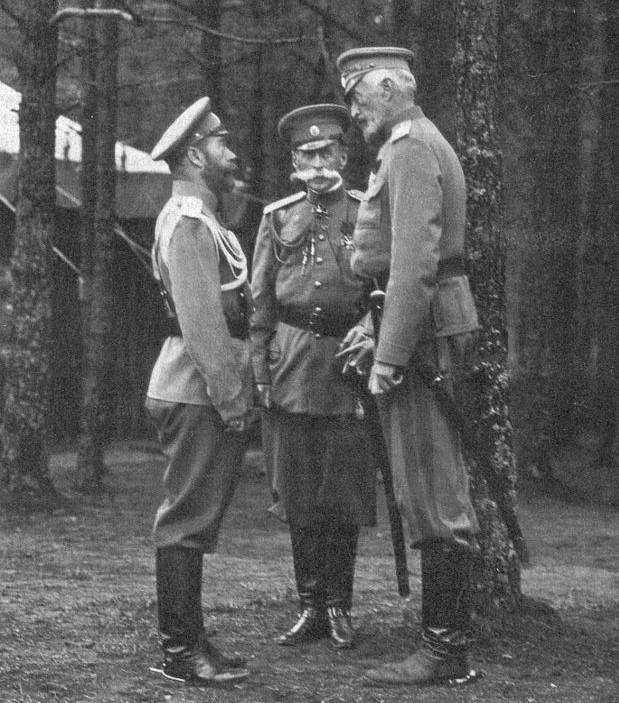
Emperor Nicholas II, his formidable uncle Nikolai Nikolayevich and the minister of the court count B.V. Frederiks
However, the Poles did not cease to thirst for freedom, and this thirst sometimes acquired the most unexpected forms. Among those who were particularly active were many who were ready to immediately start rebuilding the Polish army. And not at all against Pilsudski’s marksmen, few people knew about them at all. One of such initiatives was not slow to report to the Foreign Ministry at the rate of N.A. Kudashev:
General Yanushkevich did not wish to bind himself with any formal promises and gave himself to let Matushinsky know by telegraph if he wanted to continue this conversation ... Until now, the general’s negotiations with Matushinsky have not been resumed, but what are the decisions made by the Grand Duke and his chief of staff: how would they didn’t want to resort to Polish aid and do all the military tasks on their own, they realize that it’s not so easy now, and besides that the use of the Poles can be a very big help for the army And even if it is assumed that there will be much less than a 500000 person. Therefore, it was decided to accept the proposal, but under the condition that the formation of this Polish army would be given the character of the militia.
Thus, if from further conversations gene. Yanushkevich with Matushinsky it turns out that the proposal of the Poles is based on serious and represents real guarantees of military assistance, then the militia of the provinces that make up Privislinsky Krai will be the highest manifesto. The entire male population will enter the militia (according to the rules, of course); if, however, the Poles come from Krakow or Poznan, then our superiors will see through it ... Russian generals, officers, and guns will be given to the militia. The rest of the weapon (rifles, checkers, revolvers) already, it turns out, exists, almost was prepared to fight with us ...
I did not object to everything that General Yanushkevich told me, limiting myself to the remark that it is important to make sure Matushinsky’s authority, the degree of real assistance that can be expected from such a militia army, and that it is necessary that, in any case, this army legal; the general agreed with me completely and promised to keep me informed of his further meetings with the Poles ”(6).
Notes
1. Danilov Yu.N. Grand Duke Nikolai Nikolaevich, Paris, 1930 g., P.170.
2. International relations in the era of imperialism. Documents from the archives of the royal and provisional governments 1878-1917. M.1935, Series III, Volume VIII, Part 1, p.11.
3. Danilov Yu.N. On the way to the crash, M., 2000 g., P. 137-138.
4. Speech, July 4 (June 22) 1915
5. Kurjer Warszawski, August 12 (July 29) 1915
6. International relations in the era of imperialism. Documents from the archives of the royal and provisional governments 1878-1917. M.1935, Series III, Volume VI, Part 1, p.270-271.
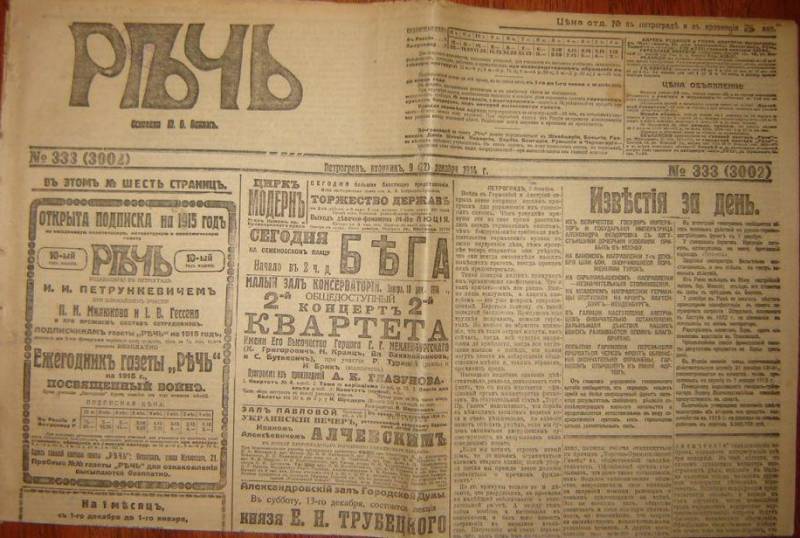
Information